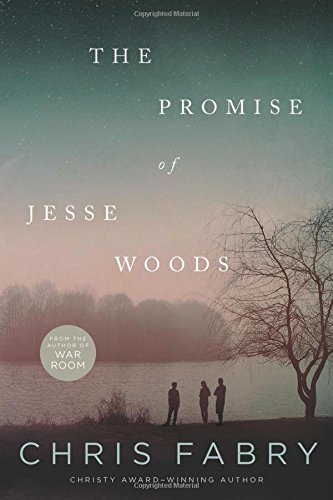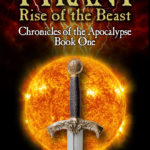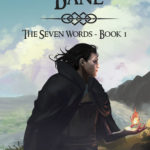Should Christian Fiction Genres Exist?
“The world does not need more Christian literature. What it needs is more Christians writing good literature.”
– C. S. Lewis
This quote, from one of the literary greats of the twentieth century, is one I’ve heard often in Christian circles. It’s a quote I generally agree with. Christian fiction has historically had quality problems and we need to emphasize the production of good literature rather than just literature with the Christian brand slapped on it.
However, some Christians take this quote in another direction. Not only should we de-emphasize the Christian fiction genre, but according to some, we shouldn’t even have a genre for Christian fiction in the first place. In the minds of some, “Christian fiction” is a retreat from the world where we insulate ourselves in closed communities with sub-par fiction.
Which leads to a question: should we really be avidly reading works of Christian fiction if the genre insulates us from the rest of the world?
Or, to put it another way: what is the purpose of reading Christian fiction? And how can we defend the genre to those who believe it’s automatically sub-par?
Tolkien vs. Lewis: two approaches to fiction
Since Lewis’s quote often comes into play in these debates, it may be helpful to compare the books he wrote to the books his fellow Inkling Tolkien wrote. Lewis, in The Chronicles of Narnia and The Space Trilogy, very much fell into the genre of Christian fiction as the books clearly displayed a rather explicit Christian worldview. Tolkien, on the other hand, in Hobbit and The Lord of the Rings, shies away from an explicitly Christian worldview and doesn’t really fall into the Christian fiction genre.
While some readers may prefer one approach over another, neither is wrong—and it goes without saying how much these two works have shaped the speculative Christian genre. Indeed, few naysayers of Christian fiction that I know fault Lewis for his genre decisions. But why is that the case? What kept Lewis’ work from becoming escapist literature?
Let’s look at what Lewis did more closely. The Chronicles of Narnia don’t target Christians because Lewis wants Christians to become comfortable or insular in their subculture. He targets Christians because he wants to challenge and equip them to go out in the world and act like faithful Christians. In Prince Caspian, Lucy learns to follow Aslan and live out a life of faith even when no one else believes her. In The Horse and His Boy, Avery learns to stop worrying about what everyone else is doing and simply do the right thing herself. In The Silver Chair, Jill and Eustace learn to follow the right path and not be turned away from it.
In contrast to stories like God’s Not Dead which pat Christians on the back and vilify the other side, Lewis is far more concerned with challenging Christians for the flaws they fall into in his stories. As a result, far from isolating Christians from the world, Lewis equips Christians to engage the world.
One way to look at Christian genres
I frequently hear other Christian writers asking how explicitly they should tie their faith into the stories they write. The way I frame it for writers deciding between Christian and secular genres is to look at it between a choice between two options:
- General fiction (secular fiction) should explore what it means to live as a human in general.
- Christian fiction should explore what it means to live as a Christian in particular.
This principle has helped me understand the purpose of these genres as a reader. While a biblical perspective should influence everything that we do, God has revealed himself through general revelation and so general fiction can lean on that to showcase true aspects of the world we live in. But we need fiction that explores more than simply what general revelation reveals. We need stories that explore life as a Christian. These are stories that may not interest secular readers. And that’s fine.
We don’t need to feel guilty that secular readers may not enjoy works of Christian fiction. We shouldn’t fear that this means Christian fiction isn’t objectively good. Sometimes certain themes are much more applicable to one audience than another. Here’s what that can look like:

The Promise of Jesse Woods by Chris Fabry looks at a man who returns to his hometown to try and steer a woman away from a potentially-disastrous marriage. In doing so, the book questions our ability to save others, specifically in the context of the Christian life. The moral quandaries the protagonist struggles with may not be quite as relevant to unbelievers, but they are exceptionally relevant for believers.
To give an example from the Christian speculative fiction genre, Echoes from the Edge by Bryan Davis explores the struggle of a young man to forgive and move past his girlfriend’s sexual past before conversion. An unbeliever may not care for or sympathize with this struggle. But Christians will—and Christians need this kind of story.
Finally, while this last one is a film, Believe Me by Riot Studios is one of my favorite Christian films because of its critique of American evangelicalism. Because half the film satirizes various elements of evangelical culture, many secular critics don’t understand its references or point. But for Christians, it’s a thought-provoking and engaging story.
None of these stories have much to appeal to secular readers. But they’re not supposed to because they’re aiming at issues particular to Christians. As long as they’re good stories which aim to challenge Christians, we shouldn’t feel guilty about enjoying such stories. Far from isolating us from the world, they equip us to better engage as Christians with the outside world.
The purpose of Christian fiction
It’s certainly possible for works of Christian fiction to unhelpfully pander to readers rather than challenging them. God’s Not Dead would be one instance of this in the film realm. But bad apples shouldn’t cause us to write off the genre as a whole or bemoan the fact that there is a commercial genre targeting Christian readers. There are good reasons for enjoying and seeking out Christian fiction. We just need to make sure we’re finding works that actually challenge and equip us.
If you’ve largely written off the Christian fiction genre because in the past you’ve seen it as sub-par pandering, perhaps the problem is that you haven’t been reading the right works in the genre. There are many works of Christian fiction out there that are legitimately good stories and that challenge Christians in appropriate ways.
You don’t need to view Christian fiction as a sub-par genre. Some writers may treat it that way. But we can demand better as readers and seek out works that truly challenge and equip Christians to live more faithful lives for Christ.
The world may not need more Christian literature—but Christians do need Christian literature.
Read great Christian stories and even if the world may not care for them, that hardly makes a difference.









































It’s just too bad that most Christian literature is the lukewarm drek that the secular world rejects out of hand. We are no longer salt, no longer beneficial to each other or anyone else.
Yep. Agreed on both fronts. There’s a value to reading Christian literature, but Christian fiction writers also need to do a better job of putting more stories like Jesse Woods, Echoes from the Edge, etc. out there rather than sub-par stories.
I suppose if reading Christian fiction did not “isolate Christians from the world” and did “equip Christians to engage the world,” then the argument is a good one. However, my experience is that avid Christian fiction readers DO read the genre in order to maintain some distance and distinction from “the world” rather than engage it. Why else would content restrictions be such a defining characteristic of Christian Fiction if not to keep us, theoretically, separate from the world?
As an author trying to get published, I certainly do sympathize with that and am not a huge fan of all the restrictions on Christian fiction (especially when certain books in the Bible clearly break some of these restrictions on Christian genres).
That being said, I think there’s a good bit of room within those restrictions to tell good stories that truly equip Christian readers. I would like to see those restrictions loosened more so we could tell even more stories in that category. And perhaps if more readers approached Christian fiction with this mindset (that this type of fiction should be about equipping us to live as Christians rather than simply being “clean”), we might see slow changes over time across the publishing world. I do think there are some readers & writers who approach the genre with this mindset. But we do need more of them.
I think there is a place for Christian fiction, and probably several different reasons to go about it–to challenge, to encourage, to teach, to put apologetics to stories, and no doubt others.
If I could ask one question about Christian fiction, it would be this–what is in a story, or should be in a story, that would make it Christian?
Excellent question. But the question ought to be what is in a story, or should be in a story, that makes it biblical, the term I prefer to “Christian.” What is biblical is not fuzzy, ambiguous or left in doubt. If God wants us to know something, He tells us clearly and plainly. If God wants us to do something, He says so clearly and plainly. If God does not want us to do something, He says so in no uncertain terms. The opposite of this is a lie. One should never ask “What if?” One should always ask, “What do the scriptures say?” If something is in a story that’s the opposite of what God says, that does not serve the One who is the Way, the Truth and the Life. That’s Shift, Ginger and Rishda Tarkaan telling us Tash is Aslan and Aslan is Tash. That’s Sauron telling Ar-Pharazon that there is no Eru, and no Ban. And we know how that turned out for all parties concerned. Search the scriptures. Our answers are there. Because God put them there.
Good question. I would say that what makes a story explicitly Christian as opposed to implicitly Christian has to do with how it handles the themes and messages of a story. Is it primarily dealing with questions that Christians specifically deal with, or questions that most people deal with? And is it answering these questions primarily with answers known through God’s special revelation, or His general revelation? I’d say the former element of both questions is what would make a novel more explicitly than implicitly Christian (and thus fall into the “Christian genre” camp).
Excellently said! 😀 Thank you for taking the time to write this article!
Thanks Rosalie!
I think we need the entire spectrum, from Christian authors who write entirely for the general market with little hint (or, yes, maybe even no hint) of their faith, to subtle, to not-so-subtle, as well as Christians writing for Christians in ways that are edgy/challenging or completely preaching-to-the-choir. I am honestly okay with movies like God’s Not Dead. Could they be done with better acting and better writing? Absolutely. But that won’t make them appealing to the secular world and I don’t think all things Christian need to be. Sometimes, it’s just for us. Reaffirmation or whatever.
And while I do not understand Christians isolating themselves and refusing to read anything that’s not Christian fiction or listen to anything that’s not Christian music, I think they have the right to do so. You never know where someone is, what their life has been like, what they can emotionally and spiritually deal with. Each person has different needs.
The only problem I have is that right now there are no options other than indie publishing for anyone who falls between the two ends of the spectrum, but I don’t feel that cutting off one end of that spectrum is going to solve the problem.
I agree that Christian stories do not need to appeal to the secular world and that we need stories on that end of the spectrum. I do question whether pat-yourself-on-the-back films like God’s Not Dead really help Christians better than, say, films that actually explore the tensions and difficulties of the Christian life like “The Song” or “Believe Me”.
I’ve long appreciated an article Andrew Barber wrote for The Gospel Coalition where he suggested that God’s Not Dead would be a more interesting and powerful story if it was about “a Christian wrestling with the fact that he knew atheists smarter and more ethical than himself.” (https://www.thegospelcoalition.org/article/the-problem-with-christian-films/) Films like this that would force us to think about our beliefs, and that both challenge /and/ reaffirm those beliefs seem more valuable than those that only do the latter.
Before I came Christ I was an avid reader of secular fiction but even then I was very selective. I wanted good stories that had good old conservative America values. They do exist but one has to look for them. When I came became a believer I had no idea. Christian wrote novels so I was very happy to find out they did. This Present Darkness was my first novel written by a fellow believer and it changed the way I looked at reading. I’ve been hooked ever since.
I spent 25 years working for a far left company so trust me when I say Christian fiction did not shelter me from the world. It did however encourage me to move forward and fight the dragons in my life all the while saving the peasants from the evil ruler.
The fiction I read is not always so cut and dry. Right now I’m rereading Stephen Lawhead’s Song of Albion trilogy. For those of you that haven’t read it, it’s not “Christian” fiction until you get to the end. It’s a great trilogy to give as a gift for unbelievers because they will not only be entertained they won’t be offended until it’s too late.
One of my favorite books is River Rising by Athol Dickson. Now that’s the kind of writing we need. Powerful story that challenges everything about ourselves. Athol is what I call a wordsmith of the first degree.
Great article. Thanks
Stephen Lawhead is amazing. One of my favorite Christian spec fic authors. I haven’t read Song of Albion yet, but it’s on my list!
I forgot to make my point (I love getting old).
Do we need a separate genre? Yes and no. I think it should be up to the individual author on how to market their books. I look for spec faith books to read but still read books by Christians that are not in the same genre. Steven James is a Christian that writes really hard hitting stories but is mainly read in the secular world. Too hard hitting for most Christians especially those that enjoy Amish romances.
Jesus said to come out of the world and not to be like them. We can most effectively reach them by using the correct bait, not by being one of them.
Agreed. The whole concept of genre is a rather modern concept anyways and more of a marketing concept than anything else. I think it’s valuable to have a marketing genre specifically for Christians, but I read widely from a number of Christian and general genres.
I shared this on my podcast page and received this question/comment: I like being able to go to a genre that shouldn’t have any cussing, etc. I am trying to figure out the issue this author has with God’s Not Dead.
Can you respond please?
To quote above:
“In contrast to stories like God’s Not Dead which pat Christians on the back and vilify the other side, Lewis is far more concerned with challenging Christians for the flaws they fall into in his stories.”
and again:
“It’s certainly possible for works of Christian fiction to unhelpfully pander to readers rather than challenging them. God’s Not Dead would be one instance of this in the film realm.”
Being able to go to a genre that is inoffensive is fine and falls into the edification side of Christian Lit. The author’s problem seems to be simply that GND is not challenging to a Christian but only serves to pat them on the back and pander to their sensibilities.
I might add that GND is also horribly acted, philosophically flawed and intellectually dull. It all ways it is an example of Christians simply liking something because it bears the title of “christian.” All critiques that I’ve found of the film are filled with comments from Christians complaining that “it isn’t that bad!” or “you just don’t like the message!”
Mike hit several points I would make. One of the big issues I see with the film is that it makes the atheist into too much of a straw man. It’s awfully convenient for the main atheist to be a complete jerk for the vast majority of the film and then have a sudden death bed conversion. If you’re going to focus your story on a clash between Christianity & atheism, I believe you need to be more intellectually honest than this and pit Christianity against the strongest opposition you can find instead of weak opposition. Giving the atheist a ton of negative traits isn’t terribly realistic (are some atheists like this? Certainly. But I know many who aren’t), and if the goal of GND is to equip Christians, it should be giving the protagonist more of a challenge.
Skilled athletes & teams prove their skill by going up against tough athletes & teams, not weak ones. I’d like to see the same thing going with Christian storytelling. It’s easy to demolish a fictional atheist when you make him a weak opponent, and that’s what I see God’s Not Dead doing.
There are additional things I would also bring up, such as how contrived the whole situation is, how preachy it is, and how one-dimensional all the other atheists in the film are, but that’s one of the main issues I have with God’s Not Dead.
While I’ve also heard people attribute the quote about “more Christians writing good literature” to C.S. Lewis, I wonder about the source of the quote. Is it from a particular piece of his writing?
I could be wrong, but I think it’s actually a misquote from a Christian Apologetics essay, where Lewis says, “What we want is not more little books about Christianity, but more little books by Christians on other subjects–with their Christianity latent…”
I think his original message wasn’t about whether Christians are writing “good” literature or not. (That is, if we’re publishing our work, putting it out there for the public, then whether it’s good work shouldn’t even be a question. Producing high quality work should be a given.) I think the message wasn’t about the quality of writing but about whether Christians are writing about *more* than just Christianity.
I believe Christian writers and readers can sometimes get confined in a box we created for ourselves, where we’re busy striving to write, read, and judge what’s “Christian enough” for/from a Christian pen, instead of more thoroughly exploring the art of literature itself, as a whole; considering what more the literature world may need beyond another religious discourse; and being freer to innovate and come up with fresh ideas (instead of seeing something new and trendy that pops up in mainstream culture, and then trying to make a “Christian version” of it, after the fact.)
But I agree with Josiah’s comment within the comments 🙂 that the Bible itself more or less breaks some of the restrictions we put on Christian Fiction. And I also suspect that if Christ Himself were to infiltrate the publishing world today with more of His fictional stories (parables) in which He makes no explicit references to God, quotes no scriptures, etc., some Christians would think Christ’s stories weren’t “Christian enough.” They’d miss what He was really doing with the art of His literature because it might not fit in the prescribed “Christian” box we’ve created.
But, anyhow. More to the point of the article, I agree. There’s likely a lot of Catholic literature I’ll never read, and that’s okay. I’m not Catholic, so Catholic literature doesn’t need to appeal to me. Neither do comic books, travel books, gardening books, or any other kinds of books that I’m simply not the audience for. Most books aren’t meant for everyone; they’re meant for specific, target audiences. For some books, the target audience is a Christian one.
I was about to comment this also. It is indeed a misquote.
However the content still stands and is especially helpful when placed into it’s original context of evangelism. When a Christian writes a book with an aim toward evangelism it is far more impactful to write a very good book and to take that book into the secular culture… instead of building a substitute culture that only appeals to those already within it.
When you make a Christian Substitute or simply an explicitly Christian story (Chronicles) your goal is different. You are no longer appealing to a secular audience to consider the gospel. You are appeal to an already christian audience with something that hopefully enriches their christian walk.
Different goals. Both purposeful. BOTH Should be high quality.
Thanks for the correction, Nadine and Mike. I’ve heard this misquote used to argue against Christian genres, which is why I used it here, but clearly I should have done more research to realize this and avoid perpetrating this misquote as an actual quote.
I appreciate the thoughts on the need to go beyond the Christian box. There can be a tendency in Christian literature I’ve read to go over the same topics and story setups too many times, and breaking the mold can help the genre to be less stagnant.